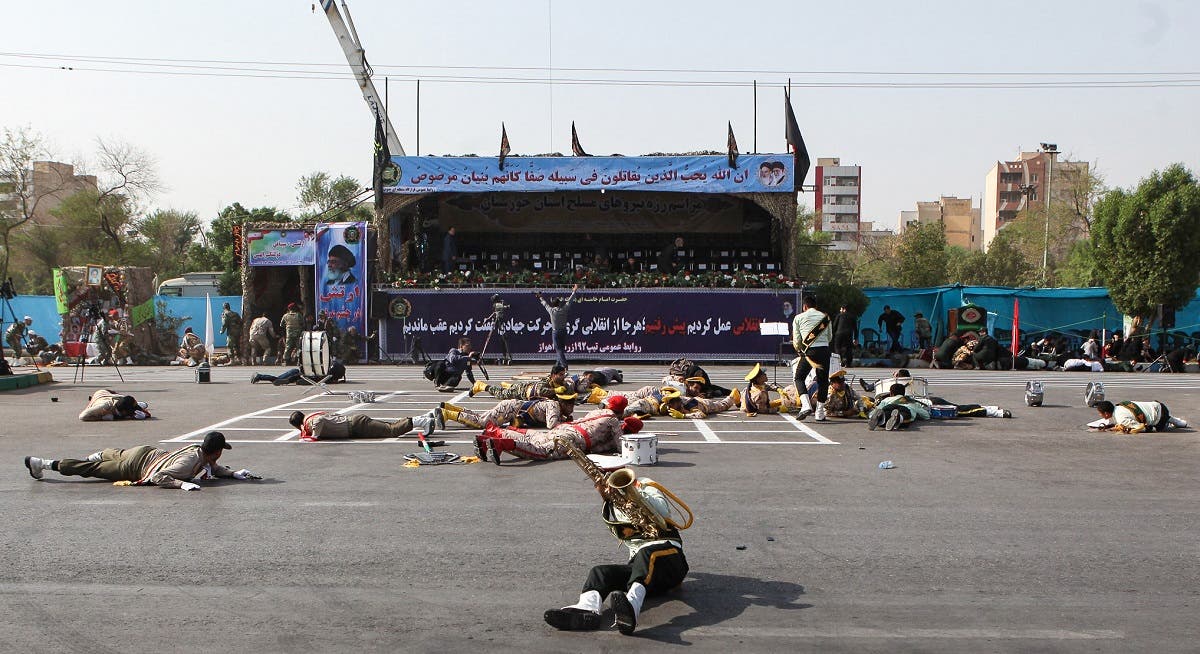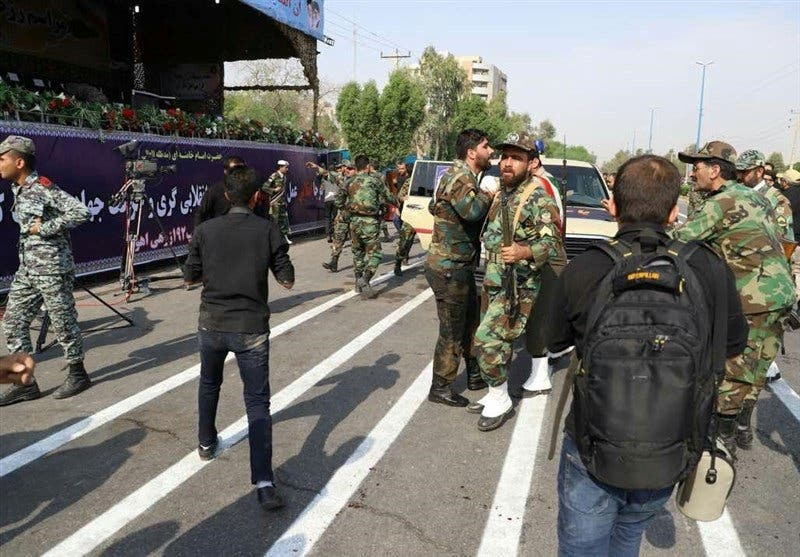Al-Arabia – The same week that the United States and Iran are heading for a showdown at the United Nations General Assembly, an attack that killed 29, including members of Iran’s prized Revolutionary Guard, has caused tensions between the two countries to rise to new heights.
The attack on the Islamic Revolutionary Guards Corps occurred September 22 in the city of Ahwaz, the capital of the oil-rich Khuzestan Province, located on the border with Iraq and home to most of Iran’s Arab minority. It is the most significant episode of violence against the Guard Corps inside Iran for many years, if not decades.
Iran is blaming its arch-foe, Saudi Arabia, and the United Arab Emirates and the United States. No doubt this blame game will be the focus of President Hassan Rouhani’s discussions and speeches when he arrives September 24 to participate in the United Nations General Assembly session in New York. It is also likely to play a large role when President Donald Trump chairs a meeting of the UN Security Council on September 26. Trump says he will focus the meeting on Iran, despite the official topic of the session, which is generally on nuclear nonproliferation.
For decades, the Shi’a Iranian regime has engaged in ethnic and religious persecution against the Ahwazis, many of whom are Shiite Muslims. As a population, the Ahwazis suffer job discrimination, high rates of disease, water pollution, food contamination, extreme poverty, and political marginalization. The regime has also banned the use of their native Arabic in schools. Khuzestan has the third-highest unemployment rate of any province in Iran, even though it produces 85 percent of Iran’s oil.
Yet Tehran has refused to address the Ahwazis’ complaints, even after persistent demonstrations against the regime—the latest of which began this past spring and have escalated.
While violence has occurred against the regime in other parts of Iran, this attack is sure to prompt even further repression against the Ahwazi community. It is also likely that the regime will crack down on other ethnic and religious minorities to signal that this sort of resistance will not go unpunished.
The Revolutionary Guard has vowed revenge for what is a major humiliation. President Hassan Rouhani declared there would be a “crushing response,” while Supreme Leader Ali Khamenei linked the attack to the United States and its “allies in the region,” meaning Saudi Arabia. Iran’s military spokesman Abolfazl Shekarchi told the Islamic Republic News Agency that “these terrorists … were trained by two … Gulf states,” meaning Saudi Arabia and the United Arab Emirates.
Both governments have denied responsibility.
The regime thus far has not provided concrete evidence to back up its claims. However, the perpetrators of the attack are probably within the Ahwazis themselves, although there is no evidence of this to date. An Ahwazi resistance group claimed responsibility. “They wanted to send a message to the world that there is widespread opposition among the Ahwazi to the regime,” one Ahwazi activist told me. “They probably thought the military parade was a good opportunity.”
 A general view of the attack during the military parade in Ahwaz. (AFP)
A general view of the attack during the military parade in Ahwaz. (AFP)
There has been no independent verification that an Ahwazi carried out the attack. ISIS, or Daesh, also claimed responsibility. But it is also possible that if Ahwazi gunmen carried out the attack, they are self-declared members of Daesh, not necessarily trained by the extremist group or associated with it. In either scenario, this attack points to growing radicalization within Iran’s Arab community.
In blaming external forces, Iran escalates the regional geopolitical rivalry with Saudi Arabia—a conflict being played out in Yemen, Iraq, Lebanon, and Syria. It will also heighten the war of words with the United States.
So why does Iran blame an Arab ethnic group it has repressed for decades, as well as outside forces, without taking any responsibility for its own actions? There are several reasons.
First, for forty years Iran’s Islamic Revolutionary governments have instituted discriminatory policies against many religious and ethnic minorities, most of whom are essentially powerless, to keep a very diverse country unified and religiously homogeneous. According to the US State Department, there are at least seven religious minorities in Iran. According to the US Institute of Peace, there are ten ethnic minorities inside Iran who make up over one-third of the population.
Iran’s constitution, executed in 1979 after the Islamic Revolution, guarantees legitimate rights for all. However, the rights mentioned in articles 3, 19, and 20 are conditioned on adherence to the official religion of the country, which is Twelver Shi’a Islam. Most Ahwazis are Shiite Muslims, though no firm statistics are available.
International NGOs, such as Amnesty International and the United Nations Development Program, have confirmed the legitimacy of many of the Ahwazis’ grievances, including, since 2005, dozens of executions carried out by the regime against the population. In a 2017–18 report, Amnesty documents at length religious persecution in Iran and the regime’s efforts to deny freedoms to religious minorities.
And the Ahwazis are not alone. The list of groups facing discrimination in Iran for religious or ethnic reasons includes Kurds, Bahais, and Sunni Muslims in the Baluchestan Province, to name a few. Various former presidents, such as Mohammad Khatami, have attempted to extend language and religious rights to some of these minorities. But backlash from hard-line elements within the regime, such as the Islamic Revolutionary Guard Corps, have reversed such policies.
Second, as the conflict with Saudi Arabia intensifies in the region, Iranian officials believe they are gaining the upper hand in Yemen, Syria, and Iraq. In Syria, with the help of Iran’s Hezbollah militia and the Russians, President Bashar al-Assad has remained in power. In Iraq, Iran’s deep roots since the US invasion of 2003 are allowing Tehran to heavily influence the formation of a new Iraqi government.
Revolutionary Guard commanders are making deals with Iraqi politicians to ensure Iraqi loyalists are in key positions to benefit Tehran economically. In Yemen, with Iranian military expertise and support, the Houthis have launched missiles into Saudi territory.
Focus on its regional activities has led Tehran to deflect responsibility for civil unrest at home onto foreign actors—although US sanctions that were reimposed in August and an upcoming oil embargo to take effect in November will doubtless exacerbate a dire economic crisis that is mostly of Iran’s own making.
The hypocrisy of Iran’s discrimination against the Ahwazis is particularly glaring. If you listen to Iranian leaders’ explanations for their deep interventions and militarization in Arab states, they claim they are “rescuing” Arab populations from their dictatorial governments and/or from extremists. Yet the Iranian regime discriminates against Arabs inside its own borders.
Regime insiders might delude themselves into thinking that outsiders are to blame for everything from the economic crisis to the attack in Ahwaz, but evidence suggests that the Iranian people are increasingly less likely to believe this propaganda. Since December 2017, there have been widespread protests across Iran—both political and economic.
Although the reimposition of sanctions by the United States is having a significant effect, the chants from the Iranian public blame their own government and Supreme Leader Khamenei personally.
Presidents Trump and Rouhani will square off this week at the UN, as expected. The attack in Ahwaz will likely provide Rouhani with an excuse to claim that the United States and its Gulf allies are fomenting unrest inside Iran. He will hope that by focusing on the attack and who is to blame, somehow the international community will cast aside criticism of Iran’s militarization in Syria, Iraq, and Yemen and its robust nuclear program. That may be wishful thinking.
 Shabtabnews In this dark night, I have lost my way – Arise from a corner, oh you the star of guidance.
Shabtabnews In this dark night, I have lost my way – Arise from a corner, oh you the star of guidance.



